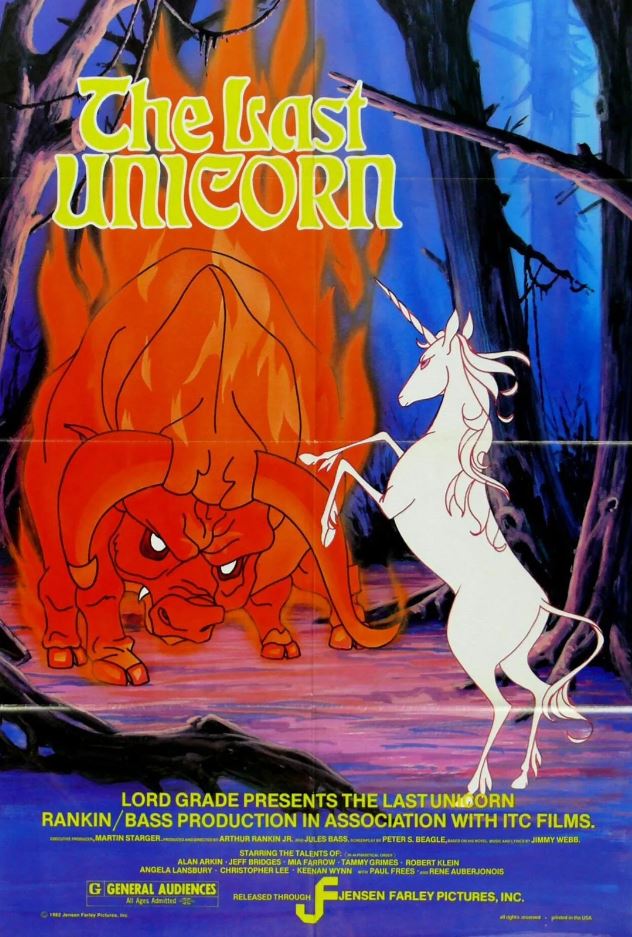The Last Unicorn

Is believing all it takes to see a unicorn?
You know the kinda movie that seems to connect with you on a spiritual level? For me, this is one of them. What's weird is that it took me a lot of re-watches until I started gaining an appreciation for it, but now it sits comfortably as one of my all time favourite animated films.
An aspect of this movie that I love is how the ideas that it explores are varied and never quite made obvious like what would be typical for children's films. They're also not obtuse, making it perfect for our brains to analyze passively, without having to dedicate too much thought to it. I guess that's why it gets better every time I watch it, more and more meaning becomes revealed.
.jpg)
.jpg)
The theme that stands out to me here is that of aging and the consequences of becoming older. There's young characters, old characters and at the center of the story is a character with no age. And each of their character's traits and philosophies is somehow linked to either their youth, old age or immortality.
In that sense, the film is about how we deal with our age and how much we should allow it to shape our character. There's the inevitable part of aging, which is the physical decline. But then there's the aspect of life experience, the wisdom that is accumulated through years of living. We not only become smarter but also have a better understanding of ourselves, our relationships and the world around us. As a result, gaps in our knowledge are filled which were previously left up to imagination. That's what this is what it's all about: the loss of one's imagination as a result of 'having seen too much'. And having lost this crucial element of joy in life, one can't even recognize the beauty of a unicorn when it's right in front of them.
.jpg)
.jpg)
The scene where this is most obviously explored is that where Molly Grue meets the unicorn, who I'll call Amalthea for convenience. (As an aside, they had the gall to censor this amazing scene, so make sure you're watching the original cut.) Molly seems older than Schmendrick, and has lived enough to know the harshness of life in a band of outlaws. It seems, however, that there's still a flicker of imagination in her: she's the first non-wizard to be able to recognise the unicorn for what she is. She curses her for appearing so late in her life (with Amalthea's response being quite blunt - "I'm here now." It's clear she has no concept of young and old, or should I say, our preconceptions for what's young and old). Molly is old, her hopes and possibilities in life have already dwindled. So why would a unicorn appear to inspire and spark imagination in her now? Because it's never too late for dreams.
Remember: the only reason she saw the unicorn was that she already believed, whether it was consciously or not. It's ultimately up to ourselves then, to properly perceive the power of our mind and believe in our imagination. We also have to cast away the preconception that having a vivid imagination is a youthful trait, or we'll fall into a situation like that of Captain Cully who, due to his experience, rejects anything that is implausible to him.
Alright, I can't delay it any longer. It's time to talk about King Haggard! Let's take a look: he's disillusioned with life, claims he's seen it all, secludes himself far away from society and the only joy he gets is from watching unicorns. Wait, that all sounds familiar...
.jpg)
.jpg)
At several points he describes having enjoyed a new experience - for a while, before it got old and he no longer desired it. Raising a son, for example. There's only one thing that doesn't get old, the one thing that 'makes him happy', and that's the unicorns. To me, this represents a man who has a vivid imagination, but allowed it to consume him entirely. He's so far out into the realm of fantasy that the real world seems too mundane and boring to want to bother with. He'd rather just escape it.
So how do we become imaginative but then avoid disappointment when the banality of life sets in? I can't pretend to have a clear answer to this, it's one of my struggles after all. But I'd like to think it's the difference between just playing videogames all day versus studying videogames, analyzing what you love about them to put them to use in your own craft. Don't lose yourself in the fantasy world of the game, you should rather see what aspects of the game you can bring with you into the real world.
Well, that's all I've got to say about the movie for now. There's plenty more themes to discuss in it, but this is the one that's most interesting to me. It goes without saying that you should give this movie a watch, or even better, a re-watch. You never know what you might find!
.jpg)




